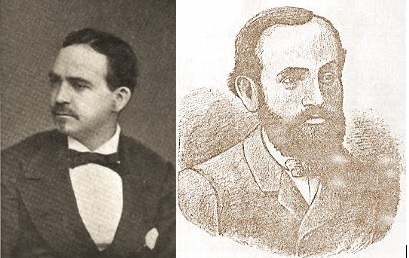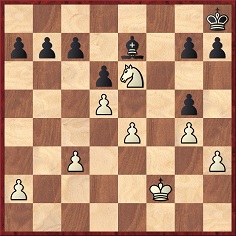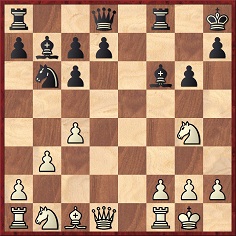
Edward Winter
(2004)

James Mortimer and Samuel Rosenthal
In 1867 the Café de la Régence, Paris was the venue of a match, now forgotten, between Samuel Rosenthal and James Mortimer. The contest (seven games up) was covered in two issues of La Stratégie (15 March 1867, pages 60-66, and 15 April 1867, pages 86-89), where the following games were given:
James Mortimer – Samuel Rosenthal
First match game, Paris, 1867
Evans Gambit Accepted
1 e4 e5 2 Nf3 Nc6 3 Bc4 Bc5 4 O-O Nf6 5 b4 Bxb4 6 c3 Be7 7 d4 d6 8 Qc2 O-O 9 Be3 Bg4 10 Nbd2 Bh5 11 Rad1 Qc8 12 h3 Bg6 13 Nh4 Kh8 14 Nxg6+ fxg6 15 f4 exf4 16 Bxf4 Nh5 17 Bh2 Qd7 18 Nf3 Nd8 19 g4 Nf4 20 Bxf4 Rxf4 21 Nh4 Ne6 22 Bxe6 Rxf1+ 23 Rxf1 Qxe6 24 Ng2 Rf8 25 Rxf8+ Bxf8 26 Nf4 Qf7 27 Qf2 Be7 28 d5 g5 29 Ne6 Qxf2+ 30 Kxf2

30…c5 31 dxc6 bxc6 32 Nd4 Bf6 33 Nxc6 Bxc3 34 Ke2 a6 35 Kd3 Be1 36 Kc4 Kg8 37 Kd5 Bg3 38 Ne7+ Kf7 39 Nf5 Bf4 40 Nxd6+ Ke7 41 Nf5+ Kf6 42 Nd4 Bc7 43 Nc6 Kf7 44 e5 Ke8 45 Nb4 a5 46 Na6 Bd8 47 Kd6 Kf7 48 Kd7 Be7 49 Nc7 Ba3 50 Nd5 Resigns.
Samuel Rosenthal – James Mortimer
Second match game, Paris, 1867
Scotch Game
1 e4 e5 2 Nf3 Nc6 3 d4 exd4 4 Nxd4 Bc5 5 Be3 Qe7 6 Nf5 Qxe4 7 Nxg7+ Kd8 8 Qe2 Bxe3 9 Qxe3 Qxe3+ 10 fxe3 d5 11 Bd3 Nge7 12 O-O Ne5 13 Nh5 Bg4 14 Nf6 h5 15 Nc3 c6 16 h3 Be6 17 Ne2 Rh6 18 Rf4 Kc7 19 Raf1 N7g6 20 R4f2 Rah8 21 e4 Nxd3 22 cxd3 dxe4 23 Nxe4 Ne5 24 Nf4 Bxa2 25 Ra1 Bd5 26 Rxa7 Bxe4 27 dxe4 Rd6 28 Ra5 f6 29 Rc5 Kb8 30 Re2 Rg8 31 Rc1 h4 32 Rf1 Rg5 33 b3 Kc7 34 Rc2 Kd7 35 Kf2 Rg3 36 Rb2 Rd4 37 Kg1 Rd6 38 Nh5 Rg6 39 Rbf2 Ke7 40 Rf4 Rd2 41 R1f2 Rxf2 42 Rxf2 Nd3 43 Nf4 Rg3 44 Nxd3 Rxd3 45 Rf3 Rxf3 46 gxf3 Kd6 47 Kf2 f5 48 Ke3 c5 49 Kf4 fxe4 50 fxe4 b5 Drawn.
James Mortimer – Samuel Rosenthal
Third match game, Paris, 1867
Bishop’s Opening
1 e4 e5 2 Bc4 Bc5 3 c3 Nf6 4 d4 exd4 5 e5 Ne4 6 Bxf7+ Kxf7 7 Qf3+ Nf6 8 exf6 Qxf6 9 Qd5+ Qe6+ 10 Qxe6+ dxe6 11 cxd4 Bxd4 12 Nf3 e5 13 O-O Re8 14 Nbd2 Be6 15 Ng5+ Kg8 16 Nxe6 Rxe6 17 Nf3 c5 18 Rb1 Nc6 19 Re1 Rae8 20 a3 h6 21 Re4 b5 22 b3 Ne7 23 b4 Nd5 24 bxc5 Nc3 25 Nxd4 exd4 26 White resigns.
James Mortimer – Samuel Rosenthal
Fourth (fifth?) match game, Paris, 1867
Giuoco Piano
1 e4 e5 2 Nf3 Nc6 3 Bc4 Bc5 4 c3 Nf6 5 d4 exd4 6 cxd4 Bb6 7 d5 Ne7 8 e5 Ne4 9 O-O d6 10 Qe2 f5 11 e6 O-O 12 Nc3 Nf6 13 Ng5 c6 14 Nf7 Qc7 15 Bf4 Ne8 16 Rac1 Ng6 17 Bg5 Ne7 18 Bb3 Bd4 19 Nb5 Qa5 20 Nxd4 Nxd5 21 Nxf5 Nec7 22 Bxd5 Nxd5 23 e7 Bxf5 24 exf8(Q)+ Rxf8 and Black resigned a few moves later.
James Mortimer – Samuel Rosenthal
Sixth (seventh?) match game, Paris, 1867
Ponziani Opening
1 e4 e5 2 Nf3 Nc6 3 c3 d5 4 Bb5 dxe4 5 Nxe5 Qd5 6 Qa4 Ne7 7 Nxc6 Nxc6 8 O-O Bd6 9 Re1 O-O 10 Bxc6 bxc6 11 Qxe4 Qxe4 12 Rxe4 Bf5 13 Re3 Bf4 14 d4 Bxe3 15 Bxe3 Bxb1 16 Rxb1 f5 17 b3 h6 18 f4 Kf7 19 Kf2 Kf6 20 Kf3 g5 21 fxg5+ hxg5 22 Rd1 Rab8 23 d5 cxd5 24 Rxd5 g4+ 25 Kf2 Rbd8 26 Rc5 Rf7 27 Rc6+ Rd6 28 Rc4 a6 29 Bd4+ Kg6 30 Bc5 Re6 31 Ba7 Rd7 32 a3 Rd1 33 Be3 c6 34 Ra4 Rb1 35 b4 Rb3 36 Rxa6 Rxc3 37 b5 Rb3 38 b6 Rb1 39 Ra7 Rd6 40 Rc7 Rdd1 41 Rxc6+ Kf7 42 Bc1 Rdxc1 43 Rxc1 Rxc1 44 a4 Rb1 45 White resigns.
Samuel Rosenthal – James Mortimer
Eighth match game, Paris, 1867
Scotch Game
1 e4 e5 2 Nf3 Nc6 3 Bb5 Nf6 4 O-O Be7 5 d4 exd4 6 e5 Nd5 7 Bxc6 bxc6 8 Nxd4 O-O 9 c4 Nb6 10 b3 Bb7 11 Nf5 g6 12 Nh6+ Kh8 13 Ng4 f5 14 exf6 Bxf6

15 Qc2 Kg8 16 Nxf6+ Qxf6 17 Bb2 Qf5 18 Qc3 Kf7 and White announced mate in five or loss of the Black queen.
When the above game was given on page 40 of the November 1902 Revue d'échecs it was unaccountably presented as won by Rosenthal against Mortimer in his 29-board simultaneous display in Paris on 28 January 1876.
Rosenthal won the match +7 –2 =1. La Stratégie published only the above six games (‘les autres parties de ce match ne nous sont pas parvenues’). Since Mortimer was supposed to have the white pieces in the odd-numbered games, the ordinal numbers specified by the magazine are, in two instances, questionable.
The rate of play was ten moves per hour, with a maximum of 30 minutes for any move and, in case of disputes about alleged non-compliance with the time-limit, an ominous-sounding provision for the audience to arbitrate on the time consumed:
‘Les joueurs s’interdisent de rester sur les coups un temps trop prolongé, les parties devront être jouées à raison de dix coups à l’heure.
Dans les cas difficiles, nul ne pourra rester plus d’une demie-heure sur ce coup, en cas de contestation la galerie sera appelée à juger du temps écoulé; le joueur qui, passé ce délai, refuserait de jouer, serait censé avoir perdu la partie.’
Mortimer wrote a paragraph about Rosenthal in an article entitled ‘Some chessplayers I have met’ on pages 173-178 of the May 1905 BCM:
‘It was in the ’60s that the late S. Rosenthal came to Paris, and, as a chessplayer, established his headquarters at the Régence. He claimed to be a Polish “refugee”, though it is doubtful if his departure from Poland had any connection whatever with the Russian tyranny over that unhappy country. Rosenthal, as a young man, was already a sound and painstaking chessplayer. He was also frugal, sober, patient and conciliatory, and succeeded in making a modest living from chess alone. At all events, I never knew him to have any other occupation. Gradually he rose to an important position in the chess world, and was justly regarded as a leading exponent of the game. Little by little, he amassed a comfortable independence through chess playing and chess teaching – the only instance of the kind I have ever known. But, though Rosenthal spent the last 40 years of his life in Paris, he never learnt to speak or write French with the most distant approach to fluency or correctness, and his innumerable malapropisms were a source of keen enjoyment to all who heard and could appreciate their drollery. His French solecisms are unfortunately not translatable into English, but I will quote one of them here, and endeavour to make it fairly intelligible. Playing one day at the Régence, he inadvertently left a piece en prise and lost the game. “Ah, well”, said he, philosophically, “j’ai fait un boulette; il faut l’expirer”. Meaning, “I have made a blunder and must expiate it”. The substitution of the verb expirer (to expire) instead of expier (to expiate) is worthy of Mrs Malaprop herself.’
Mortimer’s article did not mention their 1867 match.
(3365)
See too our articles on Mortimer and on Rosenthal.
To the Chess Notes main page.
To the Archives for other feature articles.
Copyright: Edward Winter. All rights reserved.